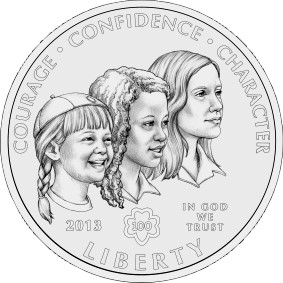As the Girl Scouts of the USA embark upon their second century, they have authorized a commemorative coin that will be available early in 2013–about the time the paperback version of my biography of Juliette Gordon Low comes out, in fact! The $1.00 coin features Girl Scouts of different ages and the three important adjectives from the motto of the GSUSA: courage, confidence, and character.
Girl Scouting today hopes to instill those traits in girls through its various programs and events. And this is fitting, because “courage, confidence, and character” perfectly describe the woman who founded the Girl Scouts, Juliette “Daisy” Gordon Low.
Daisy Gordon was born on the eve of the U.S. Civil War, when courage was required. Her childhood was marked by the privations of war, and she suffered from “brain fever” and malnutrition. She was accident prone but stoic as a girl, and turned her troubles into funny stories to amuse others. When she was four, she narrowly avoided having fingers amputated after they were smashed in a window. “Well,” she said in certain tones, “I do hope we are not going to have any more performances like this one!” When playing with her cousins, Daisy was the one they stuffed into a hollow tree or hanged from the bedpost. None of the others had her pluck.
As a young woman, Daisy decided she wanted to really learn how to ride a horse–not the genteel way that Southern belles rode–but bareback on spirited horses. Her abilities were tested one day when a train spooked her mount. The terrified horse took off like a cannonball and shot straight through the main street of a town at top speed, unstoppable. Daisy remained seated as long as she could. Her cousin found her in a ditch, shaken but unhurt, and Daisy climbed back on the horse. As they returned, forty townspeople lined the same street, heads uncovered and eyes downcast. They expected to see her mangled corpse and were stunned she had survived.
During the Spanish-American War, Juliette Low nursed sick soldiers, mingling with them in a convalescent hospital that required a her to summon the courage to move past the social norms dividing women and men. She had to be bold enough for the intimate knowledge of strangers infirmaries require. And she needed physical stamina and cleverness, too.
Probably Juliette Gordon Low’s most courageous fight was the hour-by-hour battle against her deafness. It was dispiriting, depressing, and demoralizing, and yet she never complained. The result of two different accidents, her hearing loss separated her from family and friends. It marked her as someone unusual, and wreaked havoc on her personal and private lives. Yet she used her deafness to tell comedic stories about herself, diffusing the discomfort others felt and bridging the awkwardness.
Daisy Low was courageous when confronted with her husband’s infidelity. She was courageous when she asked for a divorce. She was brave–so brave–to nurse him when it appeared he was dying. And she was brave to contest the will when he left most of his estate to his mistress. Women of her background did not divorce, and they certainly did not go to court. She had the courage of her convictions, but nothing in that chapter of her life was easy.
Not even tigers scared Juliette Low. She went hunting–and bagged an enormous one. At a time before airplanes or computers, cell phones or blue jeans, she traveled through India and Sri Lanka. She explored Pompeii and investigated Egypt. When cars were new, she motored through Europe–just herself and another woman. When only daredevils flew newfangled airplanes, Daisy Low went up in them and loved every minute.
And how brave was she to push aside her comfortable life in 1912 and throw her all into a fledgling organization called Girl Guides? Against all odds, the intrepid Juliette Gordon Low took a newish idea, one copy of the handbook, and her experiences in England, sailed for Savannah and bravely announced that she had “something for the girls of Savannah and all America” and she was ready to begin immediately! No hesitation! Girl Scouting was brave. It ran counter to many social mores and to conservative definitions of a woman’s place. Yet Juliette Low persevered, building up Girl Scouting without an MBA or any sort of executive experience, traveling without a network of professional social reformers to lean on, and devoting her time without any sort of certainty about the future.
These are only a few of the ways that Juliette Gordon Low personified “courage.” It seems an eminently fitting thing that her organization prizes courage in Girl Scouts today.
Next week: “confidence.”
___
The quote in the third paragraph comes from my book, Juliette Gordon Low: The Remarkable Founder of the Girl Scouts (New York: Viking, 2012), 29.


